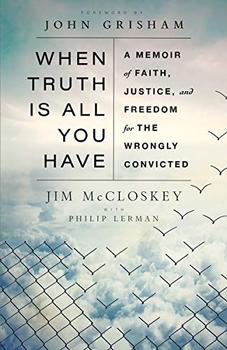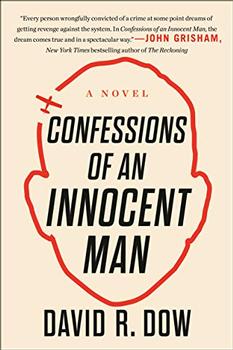Summary | Excerpt | Reading Guide | Reviews | Beyond the book | Read-Alikes | Genres & Themes | Author Bio

Murder and Injustice in a Small Town
by John GrishamSince A Time to Kill published in 1989 John
Grisham has become virtually synonymous with the term "legal thriller", a genre
that he's already broken out of a few times, such as his two 2001 novels, A
Painted House and Skipping Christmas, but with The Innocent Man he's crossed the line
not just from one fiction genre to another but from fiction into nonfiction.
Stylistically, it's often difficult to tell the difference between his first
nonfiction work and his novels, which is both the
strength and weakness of The Innocent Man.
Judged against Grisham's fictional works, The Innocent Man compares
well, his prose style is tight and fast-paced, the extremely large cast of
characters are sketched succinctly and courtroom legalities are explained in a
style simple enough for the layman to follow, and we're left in little doubt
about who are the good guys and who are the bad.
The story of Ron Williamson's life is truly a tragic one (see sidebar) and the
wrongful arrest and sentencing of both Williamson and the man who befriended
him, science teacher Dennis Fritz, was an egregious miscarriage of justice by
any measure. However, Grisham's black and white approach to the real world
which, unlike fiction, is always drawn in shades of gray, is the weakness of
The Innocent Man when judged as a work of nonfiction. Grisham is right to
vent against a justice system gone wrong and against the wretched Oklahoma
prisons (which apparently have even been condemned by Amnesty International),
but other sources such as
District
Attorney Bill Peterson's website, suggest that, as always, there are two
sides to every story and Grisham may have been a little over enthusiastic in
expressing just one of them. Also, his focus on Ron Williamson's death row
sentence verses Dennis Fritz's life imprisonment gives the reader the impression
that The Innocent Man is more a polemic against the death sentence itself
rather than the wrongful conviction of not one but two men.
Also, as a work of nonfiction, the reader might anticipate more in the way of
analysis and the big picture - if wrongful convictions in the United States
happen (which, with about 2 million people incarcerated at any one time, they
inevitably must) why is this so, how widespread is the problem and what
should we do about it? Not to mention, why does the USA have such a high
percentage of its population in prison in the first place?
Did you know?
According to the
World Prison Population List (sixth edition, 2005), formerly produced by the
UK Home Office, and now by Kings College London:
Interesting Links
![]() This review
first ran in the November 27, 2007
issue of BookBrowse Recommends.
This review
first ran in the November 27, 2007
issue of BookBrowse Recommends.

If you liked The Innocent Man, try these:

by Jim McCloskey, Philip Lerman
Published 2021
By the founder of the first organization in the United States committed to freeing the wrongly imprisoned, a riveting story of devotion, sacrifice, and vindication.

Confessions of an Innocent Man
by David R. Dow
Published 2020
A thrillingly suspenseful debut novel, and a fierce howl of rage that questions the true meaning of justice.
Your guide toexceptional books
BookBrowse seeks out and recommends the best in contemporary fiction and nonfiction—books that not only engage and entertain but also deepen our understanding of ourselves and the world around us.